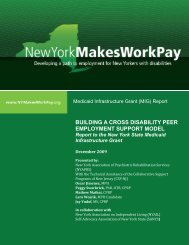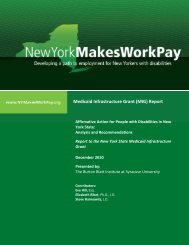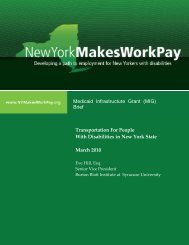Disability & Employment Law in New York State - Cornell University
Disability & Employment Law in New York State - Cornell University
Disability & Employment Law in New York State - Cornell University
You also want an ePaper? Increase the reach of your titles
YUMPU automatically turns print PDFs into web optimized ePapers that Google loves.
<strong>Disability</strong> & <strong>Employment</strong> <strong>Law</strong> <strong>in</strong> <strong>New</strong> <strong>York</strong> <strong>State</strong>:Analysis and Recommendationsprotection <strong>in</strong> <strong>New</strong> <strong>York</strong>. However, the current proposal is too limited (cover<strong>in</strong>g onlyparents car<strong>in</strong>g for children with disabilities) to prevent discrim<strong>in</strong>ation aga<strong>in</strong>st the familymembers and loved ones of people with disabilities. Employers may discrim<strong>in</strong>ate on thebasis of many types of relationships with <strong>in</strong>dividuals with disabilities (both caregiversand non-caregivers, as well as spouses, children, and other associates). All suchdiscrim<strong>in</strong>ation is improper and antithetical to the purposes of <strong>New</strong> <strong>York</strong>’santidiscrim<strong>in</strong>ation policies. Any employment discrim<strong>in</strong>ation based on association with aperson with a disability should be prohibited. Further, family caregivers should receiveadditional protected rights to workplace accommodations, where it does not create anundue burden for employers, <strong>in</strong>clud<strong>in</strong>g flexible schedul<strong>in</strong>g where appropriate. Thedef<strong>in</strong>ition of “family” should <strong>in</strong>clude spouses or domestic partners, sibl<strong>in</strong>gs, and parentsor grandparents.Policy reform should also expand the protections under the NYSHRL, us<strong>in</strong>g the more<strong>in</strong>clusive def<strong>in</strong>ition of disability modeled <strong>in</strong> the <strong>New</strong> <strong>York</strong> City Human Rights <strong>Law</strong>.Experiences under the federal ADA have demonstrated that a narrow def<strong>in</strong>ition ofdisability is unnecessary, and even antithetical, to appropriate civil rights protection forpeople with disabilities. Strict def<strong>in</strong>itions of the protected group have served tounnecessarily focus employers, employees, and courts on def<strong>in</strong>itional issues to thedetriment of substantive questions of whether actions were discrim<strong>in</strong>atory. As a result,people for whom policymakers <strong>in</strong>tended to provide protection have been excludedwithout consideration of whether discrim<strong>in</strong>ation occurred. Many <strong>in</strong>dividuals withdisabilities live below the poverty l<strong>in</strong>e and have <strong>in</strong>adequate access to health care. IfNYSHRL cont<strong>in</strong>ues to require a medical diagnosis, some <strong>in</strong>dividuals will be excludedfrom legal protection based on lack of essential medical diagnoses. In this regard,disability <strong>in</strong>tersects not only with class, but with ethnicity, race, gender and age, andtherefore is part of a set of <strong>in</strong>ter-related concerns regard<strong>in</strong>g human rights and social<strong>in</strong>equality <strong>in</strong> <strong>New</strong> <strong>York</strong>. Failure to cover all <strong>in</strong>dividuals with disabilities under theNYSHRL decreases economic autonomy and <strong>in</strong>creases dependence on state andmunicipal social welfare and charitable resources. 184 Related problems associated withentrenched poverty <strong>in</strong>clude <strong>in</strong>creased homelessness, escalat<strong>in</strong>g health problems,crime, and <strong>in</strong>creased mortality.Expand Employers Covered: Because small bus<strong>in</strong>esses constitute a large percentageof the employers <strong>in</strong> the United <strong>State</strong>s and <strong>in</strong> <strong>New</strong> <strong>York</strong>, expansion of coverage to coverall employers would significantly improve opportunities for employment for people withdisabilities. Small employers should not be entitled to term<strong>in</strong>ate or mistreat employeeswith disabilities because of disability-, race-, or gender-based prejudices. Moreover,because the reasonable accommodation requirements of the NYSHRL are limited bythe undue burden defense, which takes <strong>in</strong>to consideration the resources of thebus<strong>in</strong>ess, it is also likely that extend<strong>in</strong>g the accommodation requirement to very small184 For discussion of the <strong>in</strong>terplay between disability civil rights law and reduction of welfare dependency,see generally, Mike Oliver, <strong>Disability</strong> & Dependency: a Creation of Industrial Societies?, In Len Barton,ed., <strong>Disability</strong> & Dependency,6-22 (1989); Mark Weber, Welfare and the Civil Rights Model of <strong>Disability</strong>,unpublished (2009); Ruth O’Brien, Crippled Justice: The History of Modern <strong>Disability</strong> Rights Policy <strong>in</strong> theWorkplace, <strong>University</strong> of Chi. Press (2001).28





